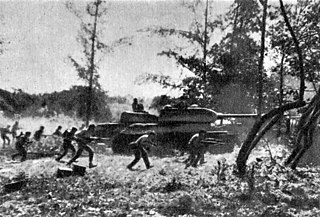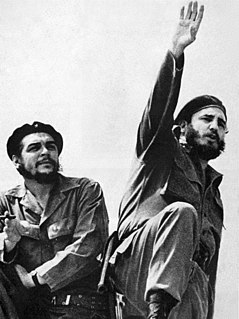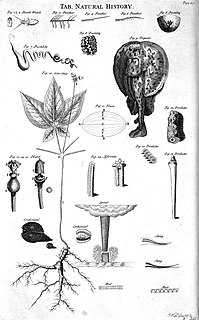The island of Cuba was inhabited by various Mesoamerican cultures prior to the arrival of the Spanish in 1492. After the arrival, Spain conquered Cuba and appointed Spanish governors to rule in Havana. In 1762, Havana was briefly occupied by Great Britain, before being returned to Spain in exchange for Florida. A series of rebellions during the 19th century failed to end the Spanish rule. However, the Spanish–American War resulted in a Spanish withdrawal from the island in 1898, and following three-and-a-half years of subsequent US military rule, Cuba gained formal independence in 1902.

The Cuban Missile Crisis, also known as the October Crisis of 1962, the Caribbean Crisis, or the Missile Scare, was a 13-day confrontation between the United States and the Soviet Union initiated by American ballistic missile deployment in Italy and Turkey pointing at the Soviet Union. With consequent Soviet ballistic missile deployment in Cuba. The confrontation is often considered the closest the Cold War came to escalating into a full-scale nuclear war.

The Spanish–American War was an armed conflict between Spain and the United States in 1898. Hostilities began in the aftermath of the internal explosion of USS Maine in Havana harbor in Cuba, leading to U.S. intervention in the Cuban War of Independence. The war led to emergence of U.S. predominance in the Caribbean region, and resulted in U.S. acquisition of Spain's Pacific possessions. That led to U.S. involvement in the Philippine Revolution and ultimately in the Philippine–American War.

Fidel Alejandro Castro Ruz was a Cuban communist revolutionary and politician who governed the Republic of Cuba as Prime Minister from 1959 to 1976 and then as President from 1976 to 2008. A Marxist–Leninist and Cuban nationalist, Castro also served as the First Secretary of the Communist Party of Cuba from 1961 until 2011. Under his administration, Cuba became a one-party communist state, while industry and business were nationalized and state socialist reforms were implemented throughout society.

Havana is the capital city, largest city, province, major port, and leading commercial center of Cuba. The city has a population of 2.1 million inhabitants, and it spans a total of 781.58 km2 (301.77 sq mi) – making it the largest city by area, the most populous city, and the fourth largest metropolitan area in the Caribbean region.

Fulgencio Batista y Zaldívar was the elected President of Cuba from 1940 to 1944, and the U.S.-backed authoritarian ruler from 1952 to 1959, before being overthrown during the Cuban Revolution. Batista initially rose to power as part of the 1933 Revolt of the Sergeants, which overthrew the provisional government of Carlos Manuel de Céspedes y Quesada. He then appointed himself chief of the armed forces, with the rank of colonel, and effectively controlled the five-member "pentarchy" that functioned as the collective head of state. He maintained this control through a string of puppet presidents until 1940, when he was himself elected President of Cuba on a populist platform. He then instated the 1940 Constitution of Cuba and served until 1944. After finishing his term he lived in Florida, returning to Cuba to run for president in 1952. Facing certain electoral defeat, he led a military coup against President Carlos Prío Socarrás that preempted the election.

The Bay of Pigs Invasion was a failed military invasion of Cuba undertaken by the Central Intelligence Agency (CIA)-sponsored paramilitary group Brigade 2506 on 17 April 1961. The United States sought the elimination of Castro for his insistence on communism. Castro's political apparatus within Cuba became a serious threat to the sanctimony of capitalism and was a threat so close to the United States in the Western Hemisphere the U.S. deemed necessary to remove. However, the U.S. gravely underestimated the force power in Cuba and consequently led their troops to their own destruction. A counter-revolutionary military group, trained and funded by the CIA, Brigade 2506 fronted the armed wing of the Democratic Revolutionary Front (DRF) and intended to overthrow the increasingly communist government of Fidel Castro. Launched from Guatemala and Nicaragua, the invading force was defeated within three days by the Cuban Revolutionary Armed Forces, under the direct command of Castro.

Operation Northwoods was a proposed, and almost implemented, false flag operation against the Cuban government that originated within the U.S. Department of Defense (DoD) and the Joint Chiefs of Staff (JCS) of the United States government in 1962. The proposals called for the Central Intelligence Agency (CIA) or other U.S. government operatives to commit acts of terrorism against American civilians and military targets, blaming them on the Cuban government, and using it to justify a war against Cuba. The plans detailed in the document included the possible assassination of Cuban émigrés, sinking boats of Cuban refugees on the high seas, hijacking planes, blowing up a U.S. ship, and orchestrating violent terrorism in U.S. cities. The proposals were rejected by John F. Kennedy.

Raúl Modesto Castro Ruz is a Cuban politician who is currently serving as the First Secretary of the Communist Party of Cuba, the most senior position in the socialist state, succeeding his brother Fidel Castro in April 2011. He has also been a member of the Politburo of the Communist Party of Cuba, the highest decision-making body since 1975. In February 2008, he was appointed the President of the Council of State and President of the Council of Ministers. He stepped down as President on 19 April 2018, but remains the first secretary of the Communist Party, holding ultimate power and authority over state and government.

The Cuban Revolution was an armed revolt conducted by Fidel Castro's revolutionary 26th of July Movement and its allies against the authoritarian government of Cuban President Fulgencio Batista. The revolution began in July 1953, and continued sporadically until the rebels finally ousted Batista on 31 December 1958, replacing his government with a revolutionary socialist state. 26 July 1959 is celebrated in Cuba as the Day of the Revolution. The 26th of July Movement later reformed along communist lines, becoming the Communist Party in October 1965.

Mark Cuban is an American businessman and investor. He is the owner of the National Basketball Association (NBA)'s Dallas Mavericks, co-owner of 2929 Entertainment and chairman of AXS TV. He is also one of the main "shark" investors on the ABC reality television series, Shark Tank. In 2011, Cuban wrote an e-book, How to Win at the Sport of Business, in which he chronicles his experiences in business and sports.

Cuban cuisine is a blend of Spanish, African, and Caribbean cuisines. Some Cuban recipes share spices and techniques with Spanish and African cooking, with some Caribbean influence in spice and flavor. This results in a blend of the several different cultural influences, A small but noteworthy Chinese influence can also be accounted for, mainly in the Havana area. There is also some Italian influence. During colonial times, Cuba was an important port for trade, and many Spaniards who lived there brought their culinary traditions with them

The United States currently imposes a commercial, economic, and financial embargo against Cuba. The United States first imposed an embargo on the sale of arms to Cuba on March 14, 1958, during the Fulgencio Batista regime. Again on October 19, 1960 the U.S. placed an embargo on exports to Cuba except for food and medicine after Cuba nationalized American-owned Cuban oil refineries without compensation. On February 7, 1962 the embargo was extended to include almost all exports.

Cuban Americans are Americans who trace their ancestry to Cuba. The word may refer to someone born in the U.S. of Cuban descent or to someone who has emigrated to the U.S. from Cuba. Cuban Americans are the third-largest Latino group in the United States.

Cuba, officially the Republic of Cuba, is a country comprising the island of Cuba as well as Isla de la Juventud and several minor archipelagos. Cuba is located in the northern Caribbean where the Caribbean Sea, Gulf of Mexico and Atlantic Ocean meet. It is east of the Yucatán Peninsula (Mexico), south of both the U.S. state of Florida and the Bahamas, west of Haiti and north of both Jamaica and the Cayman Islands. Havana is the largest city and capital; other major cities include Santiago de Cuba and Camagüey. The area of the Republic of Cuba is 110,860 square kilometres (42,800 sq mi). The island of Cuba is the largest island in Cuba and in the Caribbean, with an area of 105,006 square kilometres (40,543 sq mi), and the second-most populous after Hispaniola, with over 11 million inhabitants.

Cuba–United States relations are bilateral relations between Cuba and the United States. Cuba and the United States restored diplomatic relations on 20 July 2015, which had been severed in 1961 during the Cold War. U.S. diplomatic representation in Cuba is handled by the United States Embassy in Havana, and there is a similar Cuban Embassy in Washington, D.C. The United States, however, continues to maintain its commercial, economic, and financial embargo, which makes it illegal for U.S. corporations to do business with Cuba.

Baseball is one of the most popular sports in Cuba. It was popularized in Cuba by Nemesio Guillot, who founded the first major baseball club in the country. It became the most played sport in the country in the 1870s, before the period of American intervention.

After the establishment of diplomatic ties with the Soviet Union after the Cuban Revolution of 1959, Cuba became increasingly dependent on Soviet markets and military aid, becoming an ally of the Soviet Union during the Cold War. In 1972 Cuba joined the COMECON, an economic organization of states designed to create cooperation among the socialist planned economies dominated by the large economy of the Soviet Union. Moscow kept in regular contact with Havana, sharing varying close relations until the collapse of the bloc in 1991. After the demise of the Soviet Union, Cuba entered an era of economic hardship known as the Special Period in Time of Peace.

Cuba's prevailing religion is Christianity, primarily Roman Catholicism, although in some instances it is profoundly modified and influenced through syncretism. A common syncretic religion is Santería, which combined the Yoruba religion of the African slaves with Catholicism and some Native American strands; it shows similarities to Brazilian Umbanda and has been receiving a degree of official support. The Roman Catholic Church estimates that 60 percent of the population is Catholic, but only 5% of that 60% attends mass regularly, while independent sources estimate that as few 1.5% of the population does so.

Ernesto "Che" Guevara, also known as Ernesto Guevara de la Serna and Che Guevara Lynch, was an Argentine Marxist revolutionary, physician, author, guerrilla leader, diplomat and military theorist. A major figure of the Cuban Revolution, his stylized visage has become a ubiquitous countercultural symbol of rebellion and global insignia in popular culture.
A.S.H. Breure & A. González Guillen Bibliography of Cuban terrestrial Mollusca, including related and biohistorical papers on Cuban malacology Technical Bulletin Netherlands Centre for Biodiversity Naturalis 12; ISSN 1387-0211 pdf





















